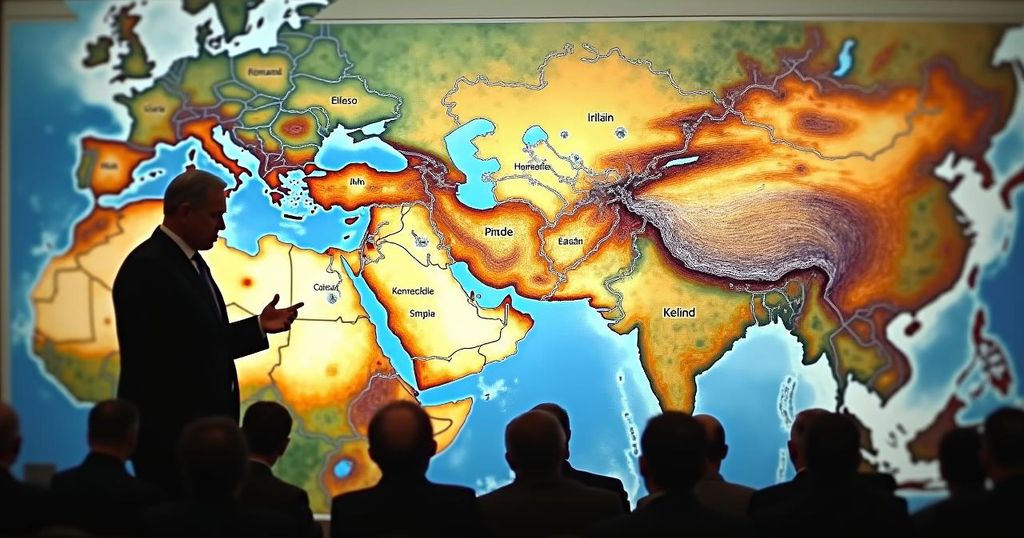Israeli Prime Minister Benjamin Netanyahu presented two maps at the UNGA, signifying India as a ‘Blessing’ and Iran as a ‘Curse.’ He called for sanctions against Iran, criticizing the global policy of appeasement. Netanyahu warned of Israel’s readiness to retaliate against Iranian aggression, emphasizing the existential dangers posed by Iran’s actions in the region.
During a recent address at the United Nations General Assembly, Israeli Prime Minister Benjamin Netanyahu presented two contrasting maps, depicting India as a “Blessing” and Iran as a “Curse.” This stark juxtaposition highlights the escalating tensions between Israel and Iran. The map designated as “Blessing” illustrated a vision for unity between Israel and its Arab allies, proposing a land bridge that would connect the Indian Ocean to the Mediterranean Sea, thereby enhancing collaboration between Israel and its partners in Asia and Europe. In contrast, the “Curse” map articulated what Netanyahu described as an “arc of terror” orchestrated by Iran, extending from the Indian Ocean to the Mediterranean. This narrative indicates Israel’s perspective on Iranian influence across the region, which Netanyahu claims endangers both Israeli sovereignty and regional stability. The maps further indicated Israeli claims over the Palestinian territories, including the West Bank, Gaza, and Syria’s Golan Heights. Netanyahu utilized this visual representation to underscore his call for international sanctions against Iran, urging global leaders to unite against Tehran’s nuclear ambitions. He expressed frustration over what he perceives as a long-standing policy of appeasement towards Iran, stating, “For too long the world has appeased Iran; it turns a blind eye to its internal repression, it turns a blind eye to external aggression. That appeasement must end and that appeasement must end now.” Furthermore, addressing Iran’s support for Hezbollah and the ongoing Israeli strikes against them, Netanyahu warned, “I have a message for the tyrants of Tehran. If you strike us, we will strike you. There is no place in Iran where the long arm of Israel cannot reach. And that is true for the entire Middle East.” The remarks reflect a notable increase in hostilities following the assassination of Hamas chief Ismail Haniyeh in Tehran several months ago and Iran’s recent condemnation of Israeli military actions in Lebanon. This presentation at the UNGA serves not only as a diplomatic maneuver but also as a signal of Israel’s strategic priorities and growing concerns regarding Iran’s influence and military posture in the region.
The tensions between Israel and Iran represent one of the most complex geopolitical dynamics in the Middle East. Israel perceives Iran’s nuclear program and its support for militant groups like Hezbollah as existential threats. Over the years, different Israeli administrations have called for international action against what they view as Iranian expansionism and aggression. The assassination of significant figures in militant organizations and the exchange of military strikes have further fueled animosities. Netanyahu’s remarks at the UN reflect ongoing efforts to galvanize international support against Iran, framing the conflict in moral and security terms as a struggle between perceived good (Israel and its allies) and evil (Iran and its proxies).
In summary, Israeli Prime Minister Benjamin Netanyahu’s address at the UN General Assembly underscored his firm stance against Iran’s perceived threats, using two maps to symbolize the divergent paths of relations with India and Iran. His calls for sanctions and heightened vigilance against Iranian aggression portray a clear message to both international and regional audiences. Netanyahu’s statements reveal a commitment to Israel’s security and a determination to counteract Iranian influence, which he frames as a significant threat to peace in the Middle East.
Original Source: www.hindustantimes.com






